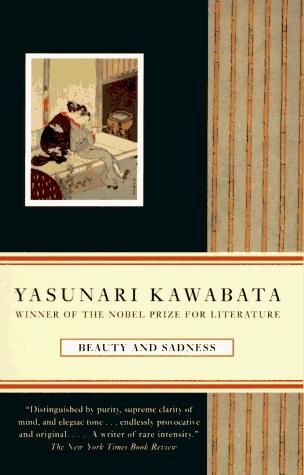admin reviewed Beauty and sadness by Yasunari Kawabata
Review of 'Beauty and sadness' on 'Goodreads'
3 stars
Kawabata haunts me. How apt, considering by the time this blog post is published, it's nearly Hallowe'en.
This is the third Kawabata book that I've read. I just keep coming back for more. Every time I find myself in the library, I wander over to the "K" authors and see if there's anything there by Kawabata.
There is a pattern in Kawabata's works. His characters are largely unlikeable and one-dimensional, especially the protagonist. What is with Kawabata and writing useless men as protagonists? Because Oki is the most boring and dull protagonist.
Kawabata, however, redeems himself in his prose. Even with these heavily flawed characters, Kawabata manages to make me feel these character's struggles and I can sympathize with them because he can portray them so well.
Concerning the controversial subject matter, I did not read the summary before reading this book. When it was revealed that Oki was a 30-something-year-old man and Otoko was just 16 when their affair started, I was startled. I don't want to say Kawabata doesn't make a big deal about it because he does. The book essentially revolves around the messy aftermath of Otoko and Oki's relationship.
Otoko is undeniably broken after. She miscarriages with Oki's child and is sent to a mental institution. She becomes a successful painter and begins a relationship with a young woman (girl? I don't know how old she is) named Keiko. In many ways, this relationship mirrors Otoko's relationship with Oki.
In a way, Kawabata forces you to accept the fact that Oki had done this to Otoko. He does romanticize it too much for my comfort (Otoko continues to pine over Oki even twenty years later despite all he put her through) but he does not neglect to show how harmful the relationship was.
Keiko is the character who realizes how despicable Oki is and she tries to get revenge. I was torn in a couple places. Even though Keiko claims to want revenge against Oki, I felt like Keiko was really getting revenge on Otoko. I think, deep down, Keiko knew that Otoko did not love Keiko or did not love her as deeply as she did Oki.
Honestly, Keiko is the weakest point in the story for me. I did not care for her one bit. I saw the ending coming a mile away. Keiko and Oki's son go out for a boat ride. Oki's son presumably drowns but Keiko lives. I can't help but feel Keiko was malicious enough to plan it out. It was the highest form of revenge. Otoko has her own child taken away from her. Oki must feel the same pain as well.
Overall, not Kawabata's strongest. But I relish these melodramatic, melancholic, love-stricken stories of his.
First sentence: Five swivel chairs were ramged along the other side of the observation car of the Kyoto express.
Second sentence: Tears were still sparkling in them as she looked up at Otoko.

